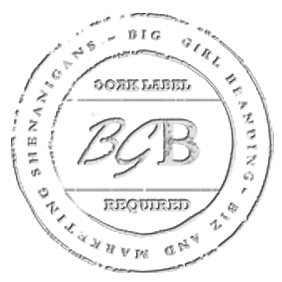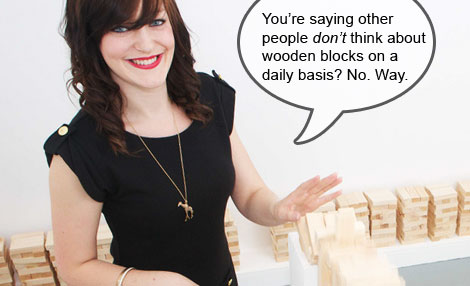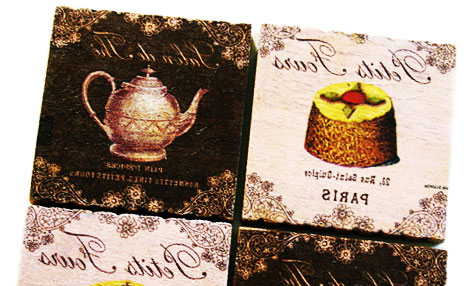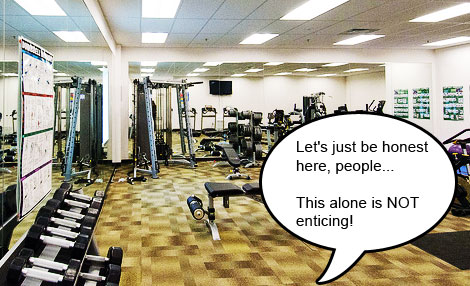This is a guest post from Stephanie on intangible benefits, and how you can use them to inspire customer interest and loyalty with your brand.
Granted it’s not always easy to pinpoint those intangibles (meh… maybe that’s why they are called intangible!) but once you do you can learn to highlight and use them to your business advantage.
People are rarely interested in a play-by-play of a product or service’s features. They are however interested in themselves and what can benefit them in an often uniquely personal way.
Ergo, think of intangible benefits as the ” uniquely personal” way to impress upon that customer or potential client, just why your product or service is so damn groovy. Now make Stephanie feel welcome in the comments please ya’ll!
There’s a commonly overlooked mistake plaguing many small businesses. Sadly, passionate business owners are extraordinarily suspectible. You may even be included. So where is this problem coming from?
Business owners– who, by sheer necessity, are always thinking about their own products and services– generally make a heavily-biased assumption about the interest other people have in what they’re selling. Or that their ideal customer has any real interest at all.
Hmmm. Think about that…
Whether or not you realize it, this may be effecting your sales. So let me give you a concrete example of how this thinking can leak into your marketing and turn off potential customers. And how you can fix it, right now.
Let’s pretend for a moment that you sell beautifully-designed coaster sets. Say you partnered with a related business to have a small photo ad featured in their popular e-mail newsletter.
I, a potential customer in your target market, am slightly hypnotized by the pretty photo and click on over to your site. Being busy and easily-distracted, however, you have a matter of seconds to catch me. The mindless curiosity that lead me over is satisfied quickly enough with just a glance of the larger picture.
As I briefly scan the rest of your product page, my eyes catch onto the first line of your description: “These designer coasters protect your furniture with class…..”
Meh. No, thanks. Your coasters are beautiful, and I know the basic benefits of owning a coaster set, but like most people, I’m not actively shopping for any at the moment.
Now stop.
What if the line had read, “Impress your guests while entertaining with an unexpected touch of class…..”
Better yet, what if they had this line with a photo also portraying the situation in action (a guest complimenting her host’s great taste, or something similar)?
Okay, now I’m slightly more intrigued, and I’ll read on. While I personally don’t care too much about coasters– I hadn’t specifically set out to buy any today, after all– I do care very much that house guests perceive me as a classy lady. Once you say you can benefit me in that respect, your coasters are on my radar.
Alternatively, what if the line read, “You only buy the best furniture, why settle for less on your home’s special touches?…..”
There are many people for whom this message would resonate. Their thought process might go, “You know, I wasn’t looking for new coasters, but they’re right, I shouldn’t settle for less than the best when I already invested in this beautiful house and luxury furniture.” For them, coasters (something they were not innately interested in) suddenly DO offer a benefit that they’re actively in pursuit of.
So what’s going on here? What makes a potential customer go from apathetic to interested so quickly?
The Typical Business Owners Description of Products Stirs No Interest
What happens when business owners assume that other people care at all about the thing they sell, is they go into feature-mode.
If asked to describe their product, they might say, “Well I sell coasters– which obviously protect furniture and add to home decor. Mine are designed really beautifully, hand-made even, and made of high-quality materials. They’re also easy to clean.”
Being beautiful, hand-made, high-quality, etc., are product features. Of course consumers want great features. If you actually are on the market for coasters, this info can sway you from one person’s product to another. You become interested in specific features in order to make sure a product meets your needs.
However, as a business owner, unless your marketing strategy is solely SEO-based (in which case your relationship with potential clients always begins with them saying, “I want to buy wooden coasters,” or the equivalent, in Google terms), the majority of people you can reach will not be specifically seeking out what you sell.
Most likely they’re busy and your product/service is not in their top 5 priority list at the moment. Maybe they already have one they’re somewhat content with. For whatever reason, they will not come to your site hungry to buy.
Enter the Special Sauce- or (What I Like to Call) Intangible Benefits
An intangible benefit is something customers purchase from you that isn’t directly apart of the physical transaction.
For example, a transaction at a jewelry store may result in ownership of a silver chain and semi-precious gemstone; a corresponding intangible benefit may be the ability for the purchaser to surprise his wife.
A transaction at a gym may result in access to fitness classes, machinery and a locker room; a cooresponding intangible benefit may be for one woman having the energy to play with her grandkids again– or prevent an impending heart attack– or look good in a slinky dress on New Years Eve.
Note that, if you have a product feature which is unusually good, you can still make this a major focus in your marketing, but you will want to use the corresponding intangible benefit rather than the bland explanation of the feature itself.
For example, I noticed that most designer-and-client communication in web design sucks. A special feature I have to offer my clients is a more effective communication method. How I market this, however, is by emphasizing how stress-free my client experience is.
Bad communication = stress, worry, anxiety. Clients are brought down by thoughts like, “Am I sure he knows what I mean? Am I sure I know what I want? How can I make sure he “gets” me?” But an intangible benefit of my special feature is to elliminate these worries and have a fun experience.
Unfortunately, there are some common objections to using intangible benefits that are holding people back.
COMMON OBJECTION #1:
“But.. but.. I want my product/service to appeal to everyone!”
This person is concerned that spotlighting an intangible benefit (like the appeal to the classy host I referred to) turns off people who don’t specifically relate. However, I believe this is an unnecessary fear.
Appealing to “everyone” means being generic, and being generic means being a commodity. Unless you’re intent on being the lowest price on the market and getting customers solely based on that fact, you need to give people specific reasons for choosing you. And specific reasons appeal to specific segments of your market.
So if your gym markets intangible benefits that appeal to senior citizens– and you serve them very well– you will attract many. If your gym doesn’t specifically appeal to anyone in particular, unless you happen to be located in an extremely strategic area, don’t expect business to boom.
Note that you can choose more than one segment of your market to target. For instance, if you have very good fitness classes for both senior citizens and moms with small children, you can create specific marketing messages for both segments and advertise them independently of each other. But I wouldn’t go crazy with this concept, simply because spreading a small business too far typically results in not-so-great service throughout.
COMMON OBJECTION #2:
“I don’t know which intangible benefits to focus on!”
There are two major things to consider when choosing which intangible benefit(s) to focus on.
First, if you already have business, ask your best customers for feedback on why they chose you or have stayed loyal to you rather than the competition. See if you can’t find some common threads.
Second, ask yourself, “What attracts ME to this business?” What intangible benefits resonate most with you? Flesh that out, and I can guarantee that you’re on to something.
COMMON OBJECTION #3:
“Intangible benefits are for sheisters!”
Using intangible benefits to market your products or services is not in any way immoral or unhonest as long as you are, well, being moral and honest!
Can your product or service deliver the intangible benefit you’ve chosen? For the segment of your market who you are targeting, is this outcome typical?
It should be the typical outcome. The only caveat I must give is that you can’t include those who don’t use the product or service as you recommend. Sure, some gym members will fail to meet their goals, but would they have met them if they followed your recommendations for how to use the gym? I hope that the answer is yes!
What Have We Learned?
In this post I have touched on a common problem amongst small business owners, how using intangibles benefits in your marketing can fix this problem, and how you can start to do this immediately.
If you have any questions, or would like some quick feedback on your own marketing messages, feel free to drop them in the comments below!
And Yo! If you found this post insanely useful, do tell your pals about it. You can Tweet it, Like it, Stumble it, Buffer it, or whatever “it” floats your fancy. All love is true love!




